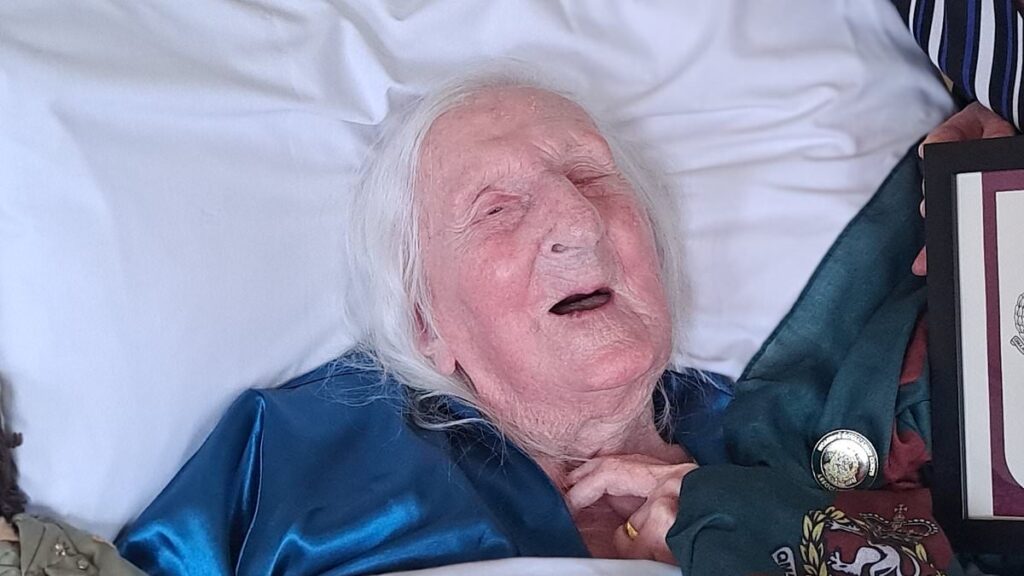With a mixture of pride and sombre memories of wartime sacrifice, Britain’s oldest surviving Second World War servicewoman today commemorates the 80th anniversary of VE Day.
Joan Harrison, 107, is deaf and nearly blind, yet she clearly recalls the moment that the war came to an end, as she sat at the wheel of her Auxiliary Territorial Service ambulance.
Newcastle-born Joan Brown, as she was then, had volunteered for war work at the outbreak of hostilities and quickly picked up the nickname, ‘Brownie’.
As news of Victory in Europe broke in the early evening, a serviceman came rushing towards the 22-year-old to tell her of the momentous good news.
She recalled: ‘Everything was still. Then, all of a sudden, he came running down the concrete path to the ambulance and said, “Brownie! The war is over!”
‘I said he must be kidding. And he said, “No, the war’s over!”
‘I jumped out – I don’t think I even locked it, which was a crime, and ran with him to the NAAFI [Navy, Army and Air Force Institutes] where everyone was gathering.
‘Hats were flying in the air. It was all men. It got a bit boisterous, and some officers came down and called “order”.
Joan Harrison, 107, is Britain’s oldest surviving female Second World War veteran. Above: In bed at her care home, Posandane Nursing Home, near Penzance, in Cornwall
Joan clearly recalls the moment that the war came to an end, as she sat at the wheel of her Auxiliary Territorial Service ambulance
‘The men calmed down. The officers were saying, you’re still in the Army, you know, get to your beds. But they couldn’t do much about the sheer joy of the moment.’
Born in Portsmouth, Joan moved with her parents to Hong Kong at age 13.
Her father, a Royal Navy admiralty engineer overseer, managed the harbour there.
His work then took them north to Newcastle-upon-Tyne.
When war broke out, Joan joined up with the women’s regiment, the Auxiliary Territorial Service (ATS), initially spending two years in civil defence before being sent to Camberley, in North-West Surrey.
There, she trained for 18 months to become an ambulance driver and driving instructor for the ATS, including maintaining the vehicles, a role that would place her at the heart of the war effort.
‘It was heavy work. We didn’t have a choice. We had to be drivers because the men were needed elsewhere,’ she added.
At one point they were stationed in barracks in Edinburgh that were deemed unsuitable for the men because of the terrible conditions.
She recalls: ‘It was so awful, cold, wet and horrible. We slept in our great coats.’
Joan is proud to have driven ATS ambulances, just like the late Queen Elizabeth.
Joan with Paula Rogers, CEO of the Women’s Royal Army Corps Association
Joan Brown, as she was then, had volunteered for war work at the outbreak of hostilities and quickly picked up the nickname, ‘Brownie’
Joan (centre) with a group of British soldiers at the rear of an ambulance
Joan Brown’s wartime driving permit, which was valid until the end of January in 1946
Joan Brown’s dog-eared pay book
Reflecting on this period, Joan considers her time in the army as ‘the best time of her life.’
She was later stationed at Boyce Barracks, in Aldershot, a training centre for the Royal Army Medical Corps and it was there that she met Charlie Harrison, the man who would become her husband.
After the war, they settled in the Midlands and although they tried to start a family, they were never able to have children. Instead, they formed a close bond with their nephew.
Joan’s vivid recollections of her time in the ATS have been recorded by two charities – the Women’s Royal Army Corps Association and Legasee.
The latter helps the public understand the impact of military activity and preserving the stories of veterans.
Joan is confirmed as being four months older than Ena Collymore-Woodstock, OD, MBE, who is also 107 and lives in Barbados.
The pocket knife issued to Joan by the ATS during her war service
Joan proudly posing for a photo in her uniform
The Jamaican was previously thought to be the oldest surviving female army veteran.
Now residing at Posandane Nursing Home, near Penzance, in Cornwall, Joan, like all ATS women, was later supported by the ATS Old Comrades Association, which evolved into the WRAC Association.
This servicewomen’s charity continues to provide invaluable camaraderie and sisterhood to Joan and her fellow veterans to this day.
Paula Rogers, CEO of the WRAC Association, said: ‘It was wonderful to be invited to meet Joan and hear her wartime stories.
We are privileged to count many ATS veterans within our Association, alongside women of all ages who have or are currently serving in any of His Majesty’s Armed Forces.
‘As we remember the sacrifices made during two world wars, other conflicts and in peacekeeping, we are hugely proud of the contribution women made to bringing about the end of WWII.’
